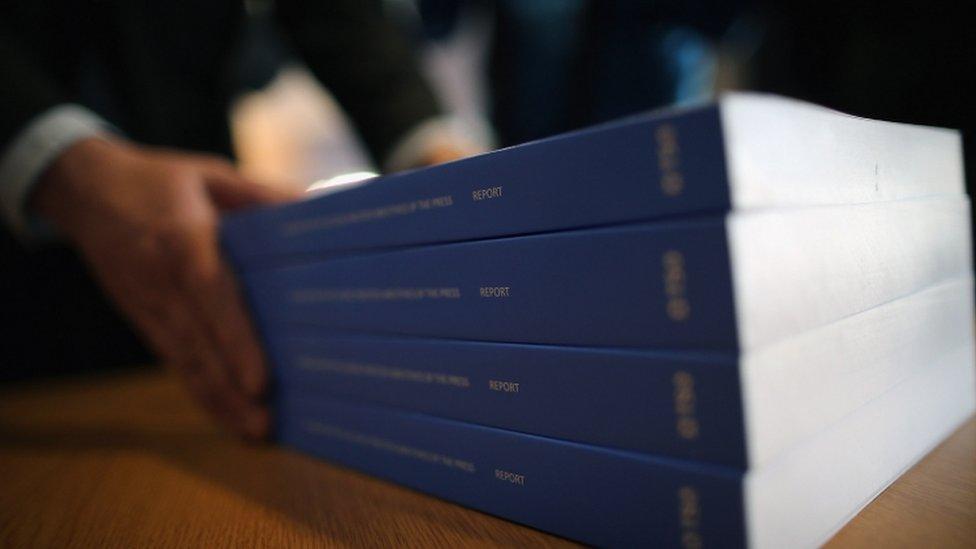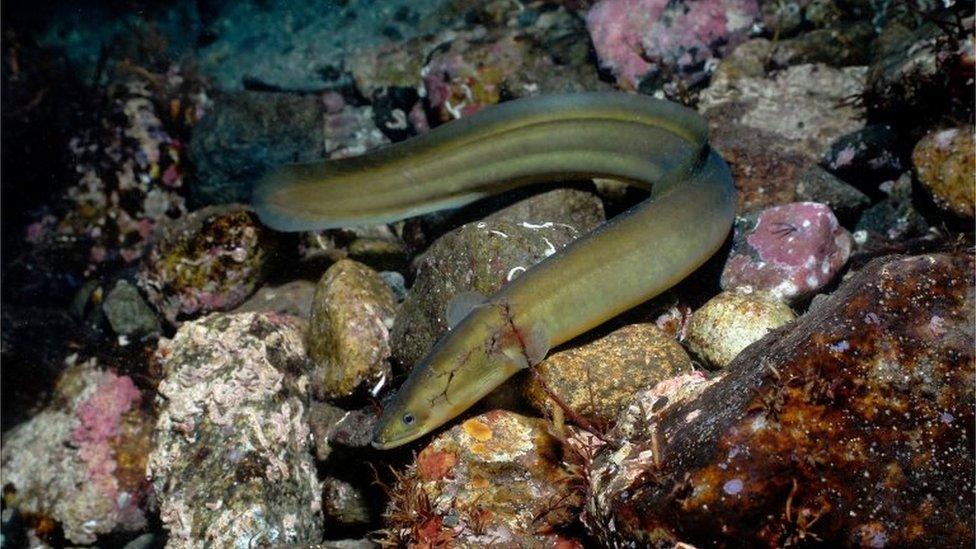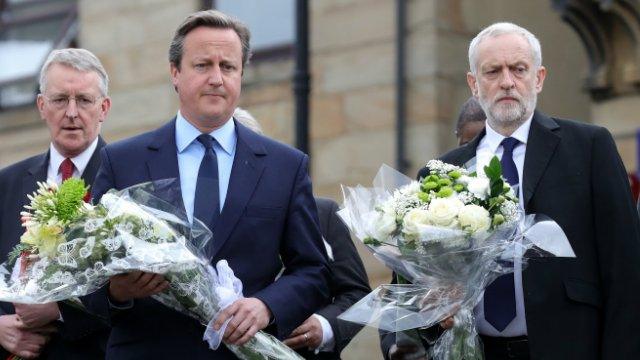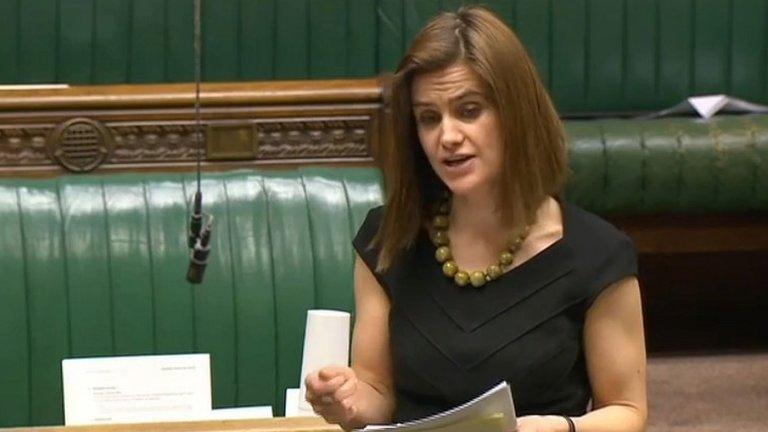Week ahead
- Published
- comments

Will recommendations in the Leveson report come back to haunt the government, as the Investigatory Powers Bill finishes its way through Parliament?
Both peers and MPs will be involved in the last rites of the Investigatory Powers Bill, this week, with a third reading in the Lords and then ping-pong between the Houses to agree its final form.
Will there be any brinkmanship over the "Leveson amendment" added by peers earlier this month? The government is keen to get the bill into law before existing internet surveillance powers lapse at the end of the year.
Also in the Lords, some interesting clashes loom over the Wales Bill, but there's a sense that the legislative agenda bequeathed from the Cameron era is beginning to peter out, while the May agenda has not yet crystallised.
Meanwhile, the select committees are increasingly assertive - and may fill the vacuum. Next week, the new Brexit Committee will probably have its first (private) meeting to work out its hit list of subjects to scrutinise. This will be a pretty important set of decisions, which will shape the way Westminster processes Brexit in the coming years.
The Health Committee seems to be gearing up on the issue of NHS and social care funding, and the Business and Industrial Strategy Committee is taking a lively interest in the nature of the assurances given to Nissan to encourage them to continue to invest in the UK - and wants the BEIS Secretary Greg Clark to appear before it.
Here's my rundown of next week's Westminster action:
Monday
The Commons meets at 2.30pm for Home Office questions- with 3.30pm, as ever, the prime-time for any ministerial statements or urgent questions....will someone seek a statement on the government's assurances to Nissan?
The day's legislation is the second reading debate on the Cultural Property (Armed Conflicts) Bill, external which puts the Hague Convention on the protection of cultural property into UK law.
In Westminster Hall (4.30pm-7.30pm) there's a Petitions Committee debate on two e-petitions (nos 125003, external and 164851, external) on driven grouse shooting. The first - signed by 123,076 people - calls for a ban, arguing that grouse shooting for 'sport' depends on intensive habitat management which increases flood risk and greenhouse gas emissions, relies on killing foxes, stoats, mountain hares etc in large numbers and often leads to the deliberate illegal killing of protected birds of prey including hen harriers.
The second - signed by 23,573 people - argues that grouse moors and grouse shooting are an integral part of moorland management both for the grouse and other native wildlife such as lapwing and curlew; it also helps support of local businesses and jobs in the local areas.
My select committee pick is the Public Accounts Committee hearing (4pm) on child protection, based on a recent National Audit Office report, external, which registered extreme disappointment that in the six years since the department recognised that children's services were not good enough, they were still not good enough.
It called for more energy, pace and determination from the Department for Education. Chair Meg Hillier described the findings as "horrifying". The witnesses include the DfE Permanent Secretary Jonathan Slater and top social workers and child protection officials.
In the Lords (2.30pm), two more new peers take their seats: first, Lord Ricketts, a former National Security Advisor, Permanent Secretary in the Foreign Office and Ambassador to Paris. He will sit as a crossbencher. Then Lord Llewellyn of Steep, Ed Llewellyn, Downing Street Chief of Staff under David Cameron.
After questions, peers will give a third reading to the Investigatory Powers Bill, external, which gives the police and security services a range of new powers to access data on internet communications - its critics call it the "Snoopers' Charter"; but it is mostly supported by Labour, so this should be a fairly brief debate.
There are a few outstanding technical amendments to deal with, from the Home Office Minister, Earl Howe, but any remaining controversy will come after the Commons reacts to amendments made by the Lords, and peers have to decide whether or not to accept their verdict.
Next comes the first committee stage debate on the Wales Bill, external.
Normally committee stage is a kind of shadow-boxing exercise in thrashing out detailed issues, but this time there's a major amendment from three Welsh Labour heavyweights. Former Welsh secretaries Peter Hain and Paul Murphy, plus their former leader, Neil Kinnock, want to delete the clause that would amend the Wales Act 2014 to remove the requirement for there to be a referendum in advance of the devolution of a portion of income tax.
In other words, they think there should be a referendum before any income tax powers are devolved - unusually, they plan to hold a vote on that amendment. Watch out too for another amendment from Lords Hain and Murphy which would ban someone not living in Wales, and not on the electoral register there, from running for election to the National Assembly or for a Welsh seat in the House of Commons. This seems to be aimed at UKIP Assembly group leader Neil Hamilton.
Another factor may be the latest report of the Lords influential Constitution Committee, which criticises the lack of clarity in the bill over the demarcation of powers between the UK Parliament and Welsh Assembly, warning that it not only risks future litigation, but also the need for further legislation to clarify the settlement.
There's also a Lib Dem motion to regret the Education (Pupil Information) (England) (Miscellaneous Amendments) Regulations 2016.
Tuesday
The Commons opens at 11.30am with Justice questions, followed (assuming no statements or UQs) by a Ten Minute Rule Bill on school admissions and special educational needs, from the Conservative Martin Vickers, who wants to make sure schools admit their fair share of children with autism and other conditions.
After that, MPs turn to the Lords amendments to the Investigatory Powers Bill - a debate which comes with a twist of Leveson....
This is on the argument that the press regulator proposed by Lord Leveson would provide a low-cost method of seeking compensation; if media organisations refused to take part in the Leveson-style regulatory mechanism, they would have to bear the costs of forcing people into a more costly route.
An alliance of Labour, Lib-Dem and crossbench peers defeated the government by a majority of 102, and that may embolden them to resist again, if the Commons rejects their amendment, especially if they do so on technical grounds, which would allow peers to offer an amendment in lieu which attempted to address any technical defects. We could see several rounds of Parliamentary ping-pong on this issue, if peers refuse to fold, because the government is legislating against the clock on this bill, which it needs to pass into law before existing interception powers lapse, at the end of the year.
And, of course, beefing up the internet surveillance powers available to the police and security services is a cause Theresa May was personally identified with, as home secretary.
In Westminster Hall, my pick of the day's debates is former Environment Secretary Caroline Spelman's, (2.30pm - 4pm) on global biodiversity. This will pick up on new research from the WWF and ZSL, which shows that global wildlife populations have fallen by 58% since 1970, with amphibious animals; those living in lakes, rivers and wetlands are suffering the biggest losses.

Environmentalists are warning that global wildlife populations have fallen an average of 58%, when compared to the 1970s, in The Living Planet report from WWF and the Zoological Society of London
She will argue that while there may be some dispute over the accuracy of the figures, there is now an "overarching consensus" that global wildlife populations are rapidly diminishing. Other subjects include apprenticeships funding (9.30am-11am); commemoration of Martin Luther King's 1967 visit to Newcastle (11am-11.30am) and a National College for Wind Energy (4.30pm-5.30pm).
Committee hearing of the day is the Health Committee hearing on suicide prevention (2pm) with witnesses from the Samaritans, MIND, NHS Providers, Royal Colleges of GPs and psychiatrists.
In the Lords (2.30pm), the main event is the second reading of the Pension Schemes Bill, which aims to ensure that those saving into a Master Trust scheme (a form of multi-employer occupational pension scheme which employers can join, rather than set up their own pension scheme) are protected.
Wednesday
The Commons opens (11.30am) with Cabinet Office questions, followed, at noon by Prime Minister's Question Time
Then comes a Ten Minute Rule Bill from the Conservative Andrew Rosindell, which is part of the multi-faceted campaign to secure compensation from the Government of Libya for victims of terrorist attacks made with the weapons and explosives shipped to the IRA by the Gaddafi regime.
The day's main debate is on a Labour motion - subject to be announced.
In Westminster Hall, two debates caught my eye: on the Good Parliament report (2.30pm-4pm) - led by the SNP's Kirsty Blackman - who once called for Parliament to become more family-friendly after she was censured by Commons authorities for bringing her children to a committee hearing. The report makes recommendations, external for how the House of Commons can meet the international standard of a "truly representative, transparent, accountable and effective" parliament, including scrapping unnecessarily complicated, antiquated, and exclusionary parliamentary procedure, language, and practices.
Reporting has tended to focus on its thoughts on breastfeeding and trans-toilets, but this is a very wide-ranging document.
And then, the Conservative Alex Chalk has a debate (4.30pm -5.30pm) on the impact of social media on the mental health of young people; he's concerned about a range of issues from cyber-bullying to the way social media can promote expectations of an unreal, perfect life and body.
On the committee corridor (2.45pm) Sir John Chilcot appears before the Liaison Committee (the super-committee of the select committee chairs) to discuss follow-up to his report on the Iraq War.
In the Lords (3pm) the main event is the third reading of the Bus Services Bill, external, somewhat battered after five government defeats on issues ranging from the right of local councils to form their own transport companies, to requiring low carbon emission standards. Then peers turn to the third committee stage day on the Policing and Crime Bill.
Thursday
The Commons day opens (9.30am) with Culture, Media and Sport; and International Trade questions, followed by the weekly Business Statement from the Leader of the House, David Lidington.
Then come debates on two subjects chosen by the Backbench Business Committee: on the effect of the UK leaving the European Union on financial and other professional services; and the Living Wage Week and the implementation of the National Living Wage.

The blast furnace at the SSI UK steel plant in Redcar
In Westminster Hall (1.30pm) the debate is on the future of the steel industry - led by the Labour MPs Tom Blenkinsop and Anna Turley, who want to discuss the latest developments in the industry. "The steel crisis has never gone away," Mr Blenkinsop says - and their debate includes the revaluation of the pension fund, and the recent changes in the top management of TaTa Steel, and call for measures to encourage R&D.
In the Lords (11am) it's the usual Thursday afternoon fare of debates chosen by backbench peers - but with one extra ingredient, the assumption that at least one of those debates will be Brexit-related, so as to allow the concerns of backbenchers to be aired. The first example of this is the potential impact of the UK's withdrawal from the EU on funding for universities and scientific research - led by Labour's Lord Soley.
The other debate is on the impact of the housing shortage on young people, in their desire to live in the communities where they were born, raised and educated.
Friday
It's private members bill day in the Commons again, (from 9.30am) with the second reading of the Conservative Alec Shelbrooke's National Minimum Wage (Workplace Internships) Bill, which seeks to ban unpaid internships, at the top of the agenda.
Then comes the Gangmasters (Licensing) and Labour Abuse Authority Bill, from Labour's Louise Haigh.
Further down the agenda, where there is little chance they will be debated, lurk the Harbours, Docks and Piers Clauses Act 1847 (Amendment) Bill; the National Health Service Bill; the Sugar in Food and Drinks (Targets, Labelling and Advertising) Bill; the Terms of Withdrawal from EU (Referendum) Bill and the Housing Standards (Preparation and Storage of Food by Tenants in Receipt of Universal Credit or Housing Benefit) Bill.
The House of Lords is not sitting.
- Published17 June 2016

- Published17 June 2016
